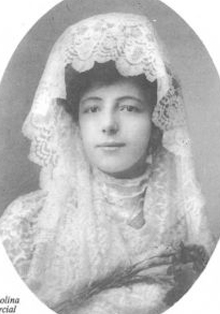Carolina Marcial-Dorado (1889-1941). The entrepreneurship of a Spanish woman in the United States is the title of the conference organised by the Instituto Cervantes this afternoon at 19.30 in its Conference Room, given by Adelaida Sagarra Gamazo, professor of American history at the University of Burgos.
The activities will be streamed on the Instituto Cervantes’ live channel and YouTube channel.
Carolina Marcial Dorado (Toledo, 1889) was born into a republican and Protestant family, cultured and liberal, committed to education, journalism and politics, and received an Anglo-Saxon education. At a very young age she left for the United States, where she could – as she herself declared in an interview – be independent, publish books, have a car and a lot of work.
She began her teaching career at Wellesley College, then at Bryn Mawr College, in Puerto Rico and Havana. Finally, he came to Barnard College, Columbia, in New York in 1920. There he earned his doctorate and founded the Spanish department, contributing to its rise. She created the Spanish Club and the Latin American Program. She worked as a mediator in obtaining scholarships for Spanish and Latin American students in the US. She organised cultural events at Barnard, collaborated with the Hispanic Society of America, and in Spanish theatre and folklore festivals. She participated in summer courses at Middlebury College and organised courses on Spanish culture in Spain for American students. He was always in contact with the Spanish colony in New York and the Sociedad de Beneficencia. He coined a method of teaching Spanish as a foreign language based on popular songs, tales and legends of Andalusian atmosphere, generally. He published several books, containing his scattered collection of songs, and a Geography. She published folk tales in several magazines and was a columnist for El Gráfico in New York from 1929. In addition, she was director of publications at Ginn and Cº, Boston. In this capacity, she participated in the mission organised by the State Department, Wood and Forbes in particular, to Anglo-Saxonise the Philippines in 1921.
He headed the Bureau pro España financed by the ITT. The aim was to promote information about our country in order to encourage tourism and generate the need for telephone communication. Through her political contacts, Carolina obtained from ITT the concession for the Compañía Nacional Telefónica de España. In this context and with a promising future ahead of her, Carolina Marcial-Dorado died unexpectedly in New York in 1941.







